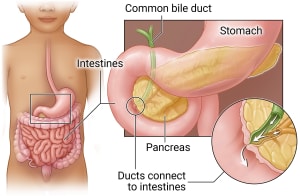How does CF affect the digestive system?
Children with cystic fibrosis (CF) have a protein in their cells that doesn't work right. The protein is called CFTR (the cystic fibrosis transmembrane regulator). CFTR controls the flow of water and certain salts in and out of the body's cells. As the movement of salt and water in and out of cells changes, mucus becomes thick.
In the digestive system, CF mainly affects the pancreas. The pancreas is an organ that puts out (secretes) certain substances. They help with digestion and control the body's blood sugar levels.
The abnormality in CFTR makes the pancreas secretions become thick. The thickened secretions can block the ducts in the pancreas. This blockage causes a drop in the amount of digestive enzymes the pancreas puts out. Because of this, a child with CF has trouble absorbing fats, some proteins, and fat-soluble vitamins A, D, E, and K.
The problems with the pancreas can get very severe. Some of the hormone cells in the pancreas can be destroyed. This may lead to glucose intolerance and type 1 diabetes. About 1 in 5 people with CF have CF-related diabetes.
Because of CF's effects on the digestive system, a child with CF may have these symptoms:
-
Frequent, bulky, greasy stools
-
A rare condition where the end part of the bowels comes out of the anus (rectal prolapse)
-
A bowel blockage caused by a baby's thick and sticky first bowel movement (meconium ileus)
-
Fat in the stools
-
Constipation
-
Stomach pain
-
Poor weight gain and growth
-
Gallstones
The child may also have bloating, flatulence, belly pain, and watery diarrhea caused by too many bacteria.
The liver may also be affected. A small number of children may actually develop liver disease. Symptoms of liver disease may include:
-
Enlarged liver
-
Swollen belly
-
Yellow color to the skin (jaundice)
-
Vomiting blood
Featured in


